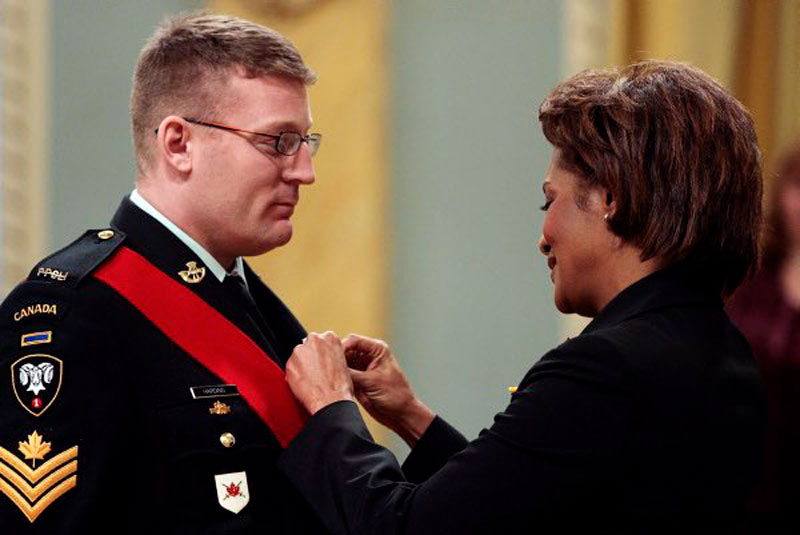
Christopher Harding receives the Medal of Military Valour for his actions Afghanistan.[Canadian Victoria Cross/Twitter]
“If there was ever a unit I could go back to, it would be ‘B’ Company 2006,” said Harding in In Their Own Words: Canadian Stories of Valour and Bravery from Afghanistan, 2001-2007. “It was a company that just clicked. Everybody seemed to mesh. Morale was high and that led to our success.”
It began with non-stop patrols. “We certainly ran into problems like suicide bombers and…the odd small ambush in Kandahar City.”
By the end of March, he was sick of patrols. “Even though it was still very dangerous, it became routine.”
But things were about to change. Taliban were swarming in the Panjwayi/Zharey district.
When Captain Nichola Goddard was killed in battle on May 17, ‘B’ Company joined the fray. They established a forward operating base in Bazar-e Panjwa’i, a regional centre.
“So ‘B’ Company was turned into a combat team.” From March onward the company saw a lot of action. “We were…trying to stir the bad guys up and get them out in the open so we could take them down.”
“Even though it was still very dangerous, it became routine.”
In July, Operation ZAHAR was planned to locate and eliminate the Taliban fighters. Around 2 a.m. on July 8, three companies came from different directions to corner the Taliban into one area.
The enemy opened fire the instant the company crossed the bridge over the Arghandab riverbed, then surrounded them.
Harding believes they had been forewarned. “Since the operation was just kicking off, we didn’t really expect anything so soon,” he said.
The fighting was intense. Harding and a crew of five were in an armoured Mercedes Gelaendewagen known to soldiers as a G-Wagon, headed for their objective, the White School. The machine gunner was firing constantly. “There were hot casings coming down through the roof burning my neck,” recalled Harding. Everyone was firing out of the vehicle.
“There were firefights going on everywhere. There were bullets whizzing by randomly. You just had the sense that they were everywhere.
“We got to the White School and we did an all-around defence with all our vehicles. The Taliban just continued on until the sun was up.”
Harding and two other Canadians, along with six Afghan National Army (ANA) soldiers, were ordered to advance on a village.
Abandoned by most of the ANA trainees, Harding and the other Canadians found themselves holding off a score of Taliban.
“And they weren’t just your run-of-the-mill Taliban.” Although he called for support, the other companies were not sure where his group was.
“I remember looking through the haze and I saw Corporal Christopher Klodt lying there on his back. So I crawled over to where he was.”
“There were firefights going on everywhere.”
Klodt, who had served with Harding in Bosnia, was about 10 metres away on open ground. He had been shot in the throat and was gasping for air. Harding applied a field bandage and, along with Private Alex Shulaev, dragged Klodt to safety.
They had to traverse “a bowling alley of a lane…perfect for bullets just to cruise down.” Private John Baron came to help carry Klodt, while Master Corporal Collin Fitzgerald covered them.
“We had to carry him through holes in walls and through buildings.”
“We were starting to be swarmed,” Harding recalled. But they rounded a corner and came upon the rest of the company, under cover and well-armed.
“We got Klodt on a stretcher and carried him to where the company medics were,” said Harding. “We had to carry him through holes in walls and through buildings.” By that time, the stretcher-bearers were overheated and dehydrated. “I wanted to just drop the stretcher because I was so tired,” noted Harding. “I didn’t and kept going.”
Finally, the wounded man was loaded on a helicopter, the start of a long medical journey. A round from an AK-47 had lodged in his spine.
Harding and his comrades returned to the battle. He earned the Medal of Military Valour for his actions that day.
Baron and Fitzgerald did not receive any mention for their efforts “though they deserve it,” said Harding.
Harding pushed for Shulaev to be recognized by Mention in Dispatches, which he was.
“Without him, I wouldn’t have gotten through that,” said Harding. “He stuck by me the whole time. He helped carry Chris out. We were fire-team partners fighting these guys off. He deserved it.”
The bullet that wounded Klodt shattered two vertebrae and crushed his spinal cord. A quadriplegic, his first son was born just after the incident. Klodt became an Invictus Games athlete and competed in wheelchair rugby tournaments with the London Annihilators team.
Advertisement





















